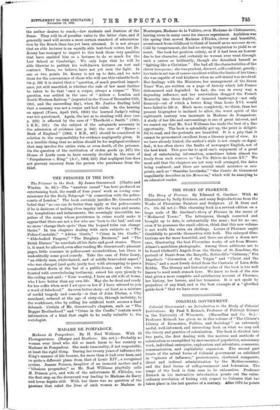MADAME DE POMPADOUR.
Madame de Pompadour. By H. Noel Williams. With 16 Photogravures. (Harper and Brothers. 25s. net.)—Probably no woman ever lived who did so much harm to her country as Madame de Pompadour. She made immorality, if not respectable, at least the right thing. During her twenty years of influence the King's manner of life became, far more than it had ever been, and on quite a different plane from that of Louis XIV., a recognised system. Jeanne Poisson, daughter of an immoral mother and a "bibulous progenitor," as Mr. Noel Williams playfully calls M. Poisson ph.e, and wife of the unfortunate M. d'Etioles, was the first step on the downward way leading to Madame du Barry and lower depths still. With her there was no question of the passions that ruled the lives of such women as Madame de Montespan, Madame de la Willie, even Madame de Chateauroux, leaving room in many cases for sincere repentance. Ambition was the spring that moved Madame d'Etioles, clever and beautiful, accustomed from childhood to think of herself as un morceau de roi. Cold by temperament, she had no strong temptation to yield to or resist. She took her position calmly, as if it had been an honour due to her character, and certainly no woman ever went through such a career so brilliantly, though she described herself as " fighting like a Christian." She had all the characteristics of the clever bourgeoise ; she was prudent, discreet, self-confident, greedy ; her taste in art was of course excellent within the limits of her time ; she was capable of real kindness when no self-denial was involved. Her dealings with the Ministers, her management of the Seven Years' War, are written on a page of history which left France dishonoured and degraded. In fact, she was in every way a degrading influence, and her materialism dragged the French Monarchy into those depths of immoral bankruptcy—not only financial—out of which a better Xing than Louis XVI. would have failed to lift it. Much more, completely, we think, than her present biographer is inclined to allow, the worst spirit of the eighteenth century was incarnate in Madame de Pompadour. A study of her life and surroundings is one of great interest, and we cannot say that Mr. Noel Williams has made the best of a fine opportunity. The book is splendidly got up, the print is delight- ful to read, and the portraits are beautiful. It is a pity that it cannot be pronounced excellent from a literary point of view. As we have already hinted, the author's style is not simple or digni- fied; it too often shows the faults of newspaper English, not of the best kind. This goes far to spoil one's enjoyment of a great deal of entertaining information, sometimes taken almost too freely from such sources as "La Vie Privee de Louis XV." We must add that the chapters are not very well arranged, the dates being confused; and there are several small mistakes or mis- prints, such as " Stanislas Leczinska," "the Comte de Grammont ungallantly describes in his Memoirs.," which will be annoying to an educated reader.






















































 Previous page
Previous page